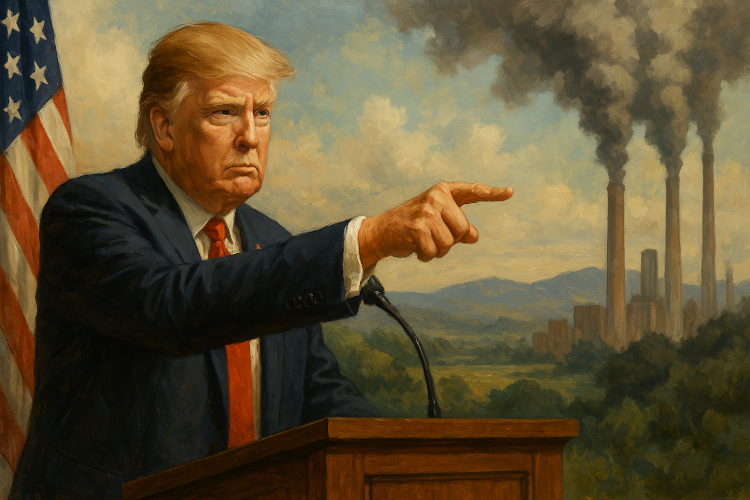The Tariff Reckoning: A Turning Point for Global Trade and the Environment
US tariffs are a wake-up call in a world of unchecked growth and consumption. Such a drastic step might reset the global economy. Regional economic blocs and the environmental benefits of a slowdown challenge the present paradigm and foresee a sustainable, fair future.

In a global economic system where growth has become synonymous with prosperity, a profound shift is not just necessary—it’s inevitable. The recent talk of tariffs being imposed on every country may appear to be a reactionary move, one that risks the economic stability of the world. But beneath the surface of this bold stance lies an urgent, long-overdue recalibration of global economic priorities—one that questions the unsustainable trajectory of overconsumption, excessive debt, and the constant drive for growth.
For decades, the United States has played a central role in driving the global economy, acting as both the primary consumer and financier of the world's expansion. Yet, the system that once facilitated post-WWII prosperity has now begun to show its cracks. The world has become increasingly dependent on American consumption, while the cost of this imbalance is being borne by both the planet and the broader global economy.
The Myth of Infinite Growth
At the heart of the crisis lies an unquestioned belief in infinite growth. Politicians, eager to maintain the illusion of progress, have piled on debt and inflated markets, all while ignoring the long-term consequences. Consumption has been elevated to a national virtue, while sustainability has become an afterthought. Growth is no longer about value; it’s about numbers—rising GDP, escalating trade volumes, and, most dangerously, the perpetuation of debt.
The imposition of tariffs—particularly those that target all nations—should not be seen as a mere protectionist gesture. Rather, it is a call to action, a moment of reckoning for a world addicted to consumption. It forces nations to confront the reality that the United States can no longer serve as the world’s economic anchor. The very foundation of global trade, once built on interdependence, must be restructured to reflect a more balanced and sustainable future.
A World in Transition: Five Possible Scenarios
The consequences of a global shift away from U.S. consumption could unfold in several ways:
1. Global Trade Realignment
With tariffs driving up the cost of access to the U.S. market, countries will likely seek stronger regional trade alliances. China may pivot toward self-sufficiency, fostering deeper economic ties within Asia. Europe could accelerate its efforts toward technological sovereignty and green innovation. The world would see the emergence of economic blocs, with less reliance on globalized trade and a focus on local resilience.
2. Domestic Renaissance in the United States
In this scenario, tariffs spur a renaissance within the U.S. economy. Manufacturing could return to American soil, accompanied by a surge in energy independence and technological innovation. Though this shift might lead to higher consumer prices in the short term, the long-term benefits could include a revitalization of the middle class and a more sustainable economic model, one less reliant on external markets.
3. Global Economic Retraction
In the worst-case scenario, the loss of U.S. consumption could lead to a contraction of the global economy. Export-dependent countries, especially those in Europe and East Asia, could face recessions, leading to financial instability and social unrest. The global debt cycle may finally reach its breaking point, causing a ripple effect throughout markets and triggering a worldwide slowdown. However, this could also mark the beginning of a post-growth economy, where the focus shifts away from GDP expansion and toward sustainability.
4. Environmental Breakthrough (By Force)
A slowdown in global trade and consumption could provide an unexpected environmental benefit. With less demand for goods and services, emissions could fall, and ecosystems could recover. This forced reduction in economic activity could pave the way for a more sustainable, circular economy, one that places less strain on the Earth’s resources. The natural world may finally get a chance to breathe, offering an opportunity to rethink what true growth means.
5. Ideological Reboot
Beyond the realm of economics, a global shift would ignite a battle of values. What is the role of growth in society? What is prosperity? The world could see the rise of competing ideologies: digital authoritarianism, democratic self-reliance, and green collectivism. In this contest, the meaning of success would be redefined, moving away from material accumulation toward the pursuit of purpose, well-being, and sustainability.
Slowing Down to Survive
What makes the imposition of tariffs so radical is not simply the action itself, but the mindset behind it: a willingness to break away from the addiction to growth. The leaders who are willing to challenge the very premise of perpetual economic expansion are often vilified, but their vision is necessary. It is a vision that understands growth for growth’s sake is a false promise—a myth that has led the world to the brink of environmental, economic, and social collapse.
Tariffs, in this context, are more than an economic tool—they are a symbol of resistance to the status quo. They force nations to rethink their place in the world and their relationship to the environment. The future of global trade cannot rest on the shaky foundation of unsustainable consumption. It must evolve into a system that values quality, resilience, and sustainability over the empty promises of infinite growth.
The world may not be ready for this shift, but the reality is clear: we cannot continue on the current trajectory. Slowing down—pausing to assess, reflect, and recalibrate—is the only way forward. We must accept the discomfort that comes with change and embrace the necessity of a new economic order—one that prioritizes the planet and its people over short-term profits.
Perhaps it’s time we all took a breath. The planet certainly needs it.